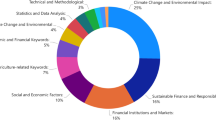Abstract
Purpose
This paper aims to verify whether life cycle assessment (LCA) research can be mainly treated as a kind of pro-environmental behavior due to public environment concerns, or academic and research activities based on scientific traditions.
Methods
This paper uses the international comparisons method for modeling and SPSS 16.0 for data processing. The data in this study were obtained from the Human Development Report by the United Nations Development Programme and the Web of Science by the Institute for Scientific Information.
Results and discussion
Our empirical study shows that the two main factors influencing the outputs per capita of the research articles in LCA in a particular country are the value of Environmental Performance Index, which represents the overall environmental quality, as well as the outputs per capita of the research articles in environmental science and technology. The results of statistical analysis show two J-type curves: with the change of the independent variables, the dependent variable changes in the same direction, but at a rate that is first slow, then fast.
Conclusions
LCA research results from scientific traditions and can only develop based on fundamental research in environmental science and technology. Further, LCA research is a pro-environmental behavior due to actual and objective effects rather than subjective motives as more research on LCA can accompany, even in some degree may lead to better overall environmental qualities. However, although environmental concerns are likely to affect the number of LCA studies as an implicit variable, this has not been empirically confirmed in our optimization model.






















Similar content being viewed by others
References
Baumann H (2002a) Int J LCA could have received better acknowledgement. Int J Life Cycle Assess 7(1):2–3
Baumann H (2002b) Publish and perish? The impact of citation indexing on the development of new fields of environmental research. J Ind Ecol 6(3–4):13–26
Franzen A, Meyer R (2010) Environmental attitudes in cross-national perspective: a multilevel analysis of the ISSP 1993 and 2000. Eur Sociol Rev 26(2):219–234
Goode WJ, Hatt PK (1952) Methods in social research. McGraw-Hill, New York, NY
Grossman GM, Krueger AB (1994) Economic growth and the environment (No. w4634). National Bureau of Economic Research
Hou Q, Mao G, Zhao L, Du H, Zuo J (2015) Mapping the scientific research on life cycle assessment: a bibliometric analysis. Int J Life Cycle Assess 20(4):541–555
Inglehart R (1995) Public support for environmental protection: objective problems and subjective values in 43 societies. PS: Polit Sci Polit 28(1):57–72
Inglehart R (1997) Modernization and postmodernization: cultural, economic, and political change in 43 societies, vol 19. Princeton University Press, Princeton, NJ
Qian G (2014) Scientometric sorting by importance for literatures on life cycle assessments and some related methodological discussions. Int J Life Cycle Assess 19(7):1462–1467
Tuckman B (1968) Conducting educational research. Thomas Y. Crowell, New York, NY
UNDP (United Nations Development Programme) (2010) Human Development Report 2010, The real wealth of nations: pathways to human development. Palgrave Macmillan, New York, NY
UNDP (United Nations Development Programme) (2011) Human Development Report 2011, Sustainability and equity: a better future for all. NY: Palgrave Macmillan, New York
Acknowledgments
This work was supported by Shanghai University of Finance and Economics (No. 2014110127) and Shanghai Institute of Higher Education (ZCGJ27-15).
Author information
Authors and Affiliations
Corresponding author
Additional information
Responsible editor: Walter Klöpffer
Rights and permissions
About this article
Cite this article
Qian, G. What causes more LCA research—subjective values, objective problems, or scientific traditions?. Int J Life Cycle Assess 21, 1049–1058 (2016). https://doi.org/10.1007/s11367-016-1111-z
Received:
Accepted:
Published:
Issue Date:
DOI: https://doi.org/10.1007/s11367-016-1111-z




